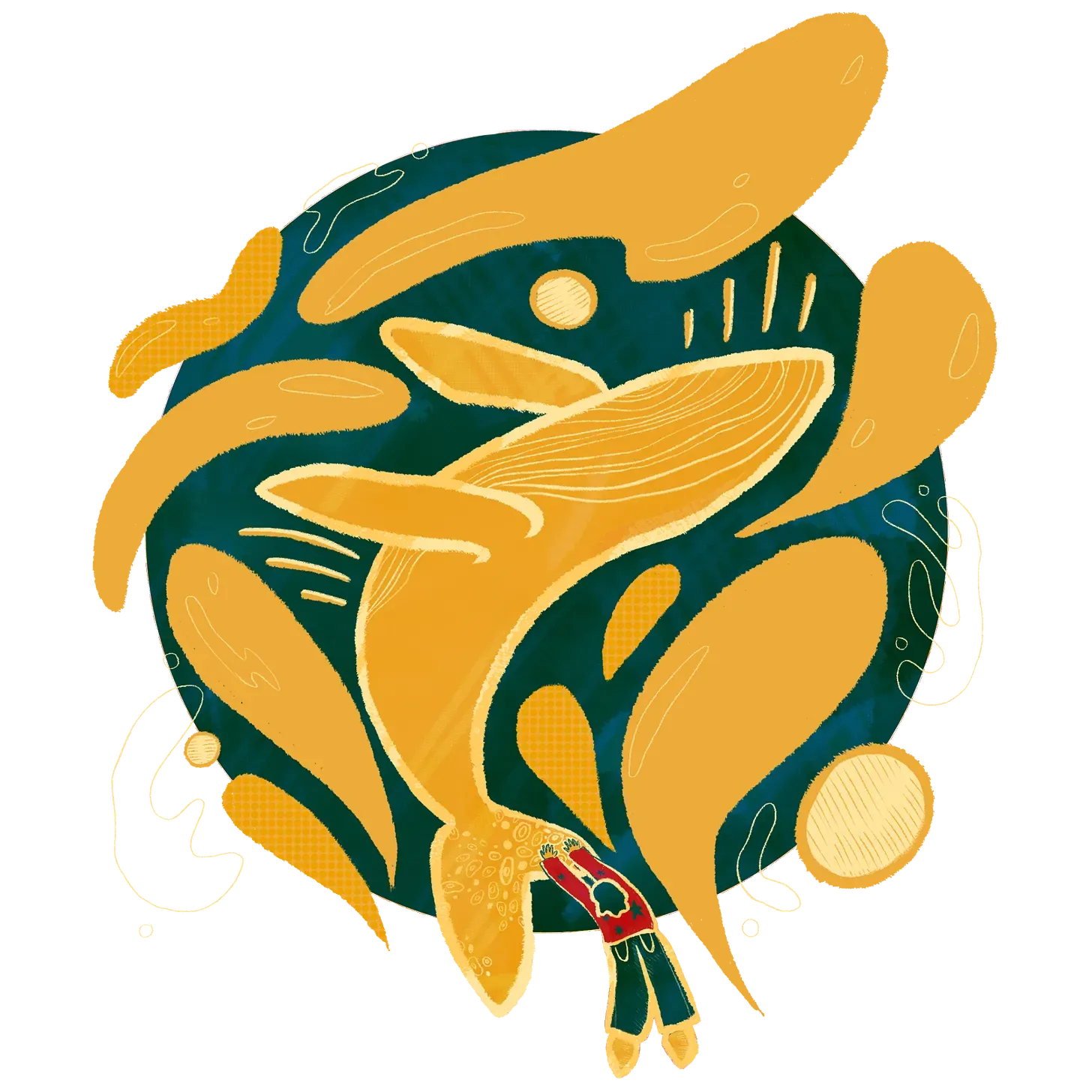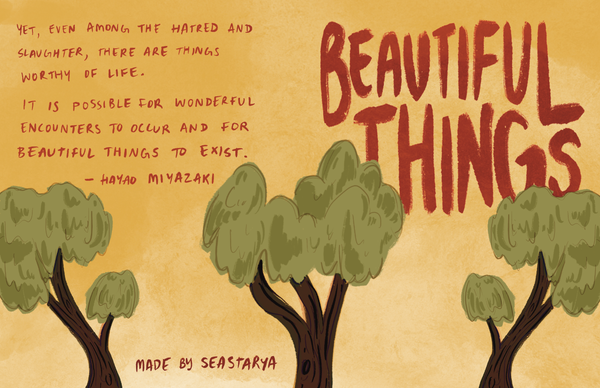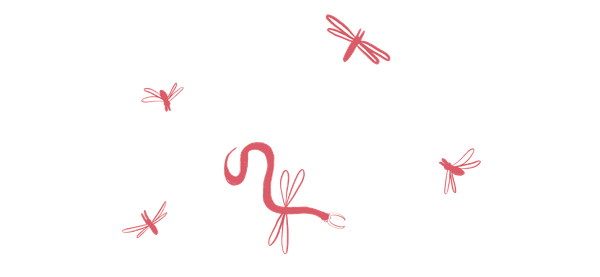chaos, complexity, & learning why fish don’t exist
plus, today is Taxonomist Appreciation Day

Recently, I picked up Why Fish Don’t Exist by Lulu Miller with the looming presumption that it would frustrate me. The book is a history of and meditation on the life of David Starr Jordan, a hugely powerful, high-held figure in natural history widely credited with scoping out the classification of fishes as it exists today—and in addition to serving as President of Stanford University and subsequently the California Academy of Sciences, he was one of the figures at the forefront of a movement to legalize eugenics. When I began this book, I was semi-prepared for another story revering a “world-renowned scientist” with a “complicated history” (the phrase “complicated history” being a way of glazing over the true horrors this scientist inflicted on people with his power). I was not excited about that.
But as I kept reading, I was pleasantly surprised to be proven wrong. While the book opens idealizing Jordan’s curiosity and drive to study the natural world—which exist so strongly that he, against all odds, just keeps going despite uncontrollable circumstances destroying his life’s work multiple times—Miller later pulls no punches in writing about how this 19th century ichthyologist’s attempt to imprint his internal order onto what he classified as “chaos” went horribly awry. Along the way, she weaves in reflections on her own journey grappling with Jordan’s amorally achieved successes.
Recapping the gems of Why Fish Don’t Exist:
- This book emphasizes that it’s okay to be wrong, but that it’s not at all okay to not listen or change when being made aware of the mistake.
- This book outlines ways to repent and make change externally, but never dismisses the power and importance of introspective self-belief without need for external validation.
- This is a book about nuance—a case study in how we can individually identify white supremacist ideals embedded in Western science and move forward with more whole storytelling around humans whose fraught histories live far beyond their time in how we look at the world around us.
The core thesis of Why Fish Don’t Exist is that forcing order upon something is a dangerous game with radiating and disproportionate impacts—and Miller is super up-front with this.
The going, going, going attitude that Jordan had was, in my understanding, a key aspect of his emerging toxicity. Science as we know it today would grow with so much more grace if we slowed down (listen to: this Ologies podcast episode with Dr. Robin Wall Kimmerer).
Back to my initial weariness around this book: I was part of the audience that went in knowing Jordan was a strong eugenics advocate, so a large part of me was frustrated that Miller didn’t start with that. I felt uneasy in the early-on admiring recounting of his life, the regard for his practices of pushing forward despite any and all dissent—whether from natural disaster or humans urging him to be more thoughtful. I wondered (and continue to wonder) if this book still counts as upholding a figure that maybe shouldn’t be upheld at all in history. But ultimately, what I do know is that a big part of this book’s power is in demonstrating how to grapple with problematic idols and how to begin reckoning with ways in which “purpose” and “order” have been taken to toxic extremes by legacies of white supremacy.
I came out of my undergrad program learning that science (and by “science” here I mean the Western scientific practices that are so deeply embedded in what we call research and academia today) has so much work to do with how we uphold single heroic figures in the field rather than teams and collaboration, how we revere the “fathers” of any given sub-field, like Charles Darwin and evolution or Carl Linnaeus and modern taxonomy.
While I know so many of Jordan’s scientific collaborators were lost to history because of Jordan’s racism and refusal to share credit with anyone he deemed “unfit” (his words), I’m left wondering if there was somehow another way for Why Fish Don’t Exist to uplift past and present scientists and taxonomists who are slowing down and changing the ways we classify nature.
But, the good and decent and to-be-improved all said—I’m left with a few questions (far from answered, but some of my early thoughts exist here).
What does it mean to be a good taxonomist today?
David Starr Jordan is no longer around, but taxonomy is well, alive, and by no means going away. Museums, academic institutions, scientists working from community-sourced data, and more all weave together to describe-then-contextualize different ecosystems across the globe—“describing” by publishing papers about the visible (and invisible) definitions of species, and “contextualizing” by mapping species relationships to one another and their surrounding environments. There’s certainly so much to this field that I don’t understand, but here’s a decent place to start learning more about what taxonomy looks like today and what it contributes to our greater understanding.
And another closely following: How can we possibly keep science around if so much of it is so deeply, structurally, institutionally corrupt? I’m still working on figuring out the answer to this one, starting with reading books like Dr. Jessica Hernandez’s Fresh Banana Leaves and Angela Saini’s Superior.
Where else does the toxic form of the order-chaos battle continue on today?
My partner works in a synthetic biology lab, one of just a few of its kind in academia right now—as gene-focused tools and methods have developed over the years, so they’ve become increasingly applied to practice today.
When I learned of David Starr Jordan’s incessant pushing for legalized eugenics practices, I wondered how he might react to the technology that exists today, whether that’s in the form of extensive DNA sequencing tools or in the form of the bacteria-derived, human-modified CRISPR that’s been sweeping the popular sphere of biology over the past several years. Both huge revolutions to how we practice and learn about biology today, both hugely inspiring in what well-rounded health care might look like in the future—but in each case, I suspect outcomes would only be good when the steps along the way are held in immense scrutiny and accountability at every turn. In fewer words, I want a philosopher/ethicist/social scientist (better yet, several) at every single gene-tech decision-making session. And I wonder what other order-chaos conflicts will emerge soon.
What would make taxonomy more inclusive and whole?
Castilleja is a group of plants known as the “paintbrushes.” They’re scattered around California in diverse habitats, existing in immensely different morphs (both at a physical and genetic level). They defy basically all categories of existence that prolific botanists have outlined to date. (Plus, they’re a parasite, meaning they have all kinds of wacky things going on even beyond defying species boundaries. They stay busy.)
There’s no one way to exist as a human, and likewise there may not be one way to exist as a taxonomically defined species. Obviously, I don’t have experience or authority to define species guidelines, and I’m grateful to the scientists doing the work of describing and outlining species for scientific documentation (including this phenomenal scientist who’s actually working on understanding Castilleja, among other things). Laying parameters and constraints gives a framework to understand interactions and assess how to protect and restore our world from damage that big industries and callous, flawed systems have done unto it for years.
BUT: as someone working on my science communication skills, I’m not going to stop wondering how we can keep pushing ourselves to think and define differently, with species and beyond. Castilleja is such a prime example of how there’s often so much more than meets the eye—and I hope to learn more about this plant and what it’ll take to understand its unique role in our world as a way of wrapping my head around the steps needed to make taxonomy more inclusive and whole. I want to know more about the specific ways that impressing order rather than embracing complexity may prevent us from engaging with nature in deep and meaningful ways that, ultimately, (as environmentalist Leah Thomas writes in her new book) protect both people and planet. I wonder if focusing on understanding over order, embracing complexity over fighting chaos, is a way forward.
And finally, the question of the book: why DON’T fish exist?
I definitely recommend reading Miller’s overview of this, since the answer to this question is part of what really cements her understanding of order and chaos by the end of the book. But, by the science, fish don’t exist because within the “fish” category, there exists a plethora of organisms so distantly related from one another that they can hardly be branched together. But for now, a bit I liked straight from the book:
“This was what Darwin was trying so hard to get his readers to see: that there is never just one way of ranking nature's organisms. To get stuck on a single hierarchy is to miss the bigger picture, the messy truth of nature, the ‘whole machinery of life.’ The work of good science is to try and peer beyond the ‘convenient’ lines we draw over nature. To peer beyond intuition where something wilder lives. To know that in every organism at which you gaze, there is complexity you will never comprehend.”
Now, go forth & find some other taxonomists to learn about! Here are some words I search on Twitter to find folks in the area: taxonomy, systematics, phylogenetics, evolutionary history, natural history. Let me know if you think of any others!



